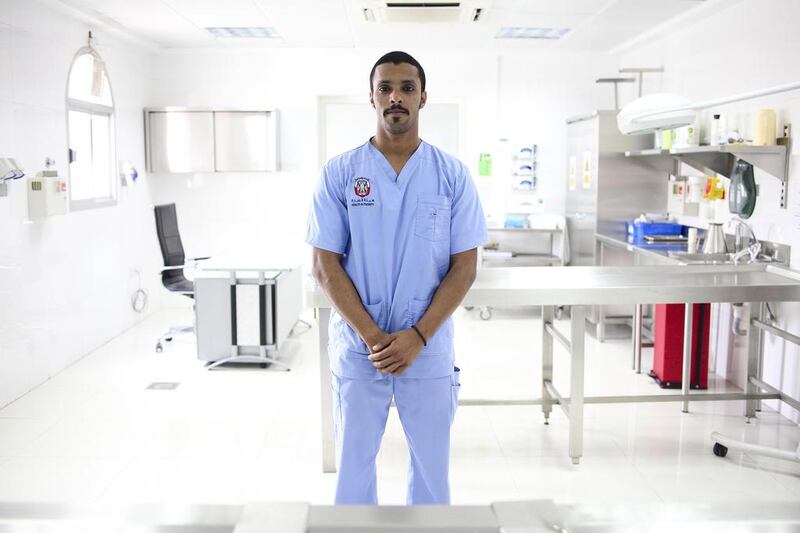ABU DHABI // Of the thousands of bodies that have passed through the Abu Dhabi main mortuary, it was that of three-year-old Nizaha Aalaa that left the biggest impression on the two morticians who were called to the scene of her death.
Nizaha was in her first month as a pupil at Al Worood Academy Private School when she died from heat exhaustion after being locked in a bus on October 7.
Abdullah Al Hanaee and Hamdan Al Qubaisi were called to remove her body.
“We got a call from operations at around noon that there was a girl who had died in a school,” Mr Al Hanaee said. “We didn’t know at the time that she had died inside the bus.
“When we arrived at the school, her parents were there and there was a lot of activity. Her parents were crying and the girl, we were told, was moved to the school clinic. We took the report from the police officer at the scene and went to take the body.”
At the time, Mr Al Hanaee’s wife was pregnant with their daughter, and Nizaha’s death hit him very hard.
“We see many cases every day,” the 23-year-old Emirati said. “We come across bodies that have been burned, destroyed – but nothing has truly upset us like this girl.”
It was the sight of her in the clinic, still in her school uniform, that broke the hearts of the young men.
“Hamdan and I carried her and put her in a body bag. We were too upset to speak to anyone.”
Marwan Al Marzouqi said he cried that day.
“When you send an innocent to school, you never expect that she will not come back,” he said.
Mr Al Hanaee joined the mortuary almost two years ago.
“I applied for a job at the health authority and they suggested the mortuary but asked that I first see the place before accepting the job.”
The first week was difficult and he decided to find another job.
“It was hard for me, seeing all the bodies, the smell. Hardest of all was seeing the families grieving.”
Mr Al Hanaee, one of nine children, said his family was also reluctant to have him work at the mortuary.
“At first my wife wouldn’t tell anyone. Even I was too ashamed to tell anyone.”
But things have changed.
“I now proudly tell everyone and encourage my friends to join,” he said. “I’ve got many job offers but I’m happy here.”
He said he has gained a strong appreciation of life.
“This job has changed my life. I see many people my age and even younger dead. I’m reminded every day how short life is. I’ve become closer to God and more appreciative of life.”
But his colleague Mr Al Qubaisi, 23, quickly took a liking to the job.
He began working as a mortuary technician last November.
“The first time I saw a body was two days after I started. I was asked to register it. I felt no fear. I dealt with it as if I was dealing with someone who was asleep,” he said. “I don’t think of them as dead. They are just asleep.
“It’s their families when they come to see them or wash them, that affect me,” he said. “Some of my friends ask me why I don’t look for other jobs but I’m comfortable here.”
Both men work in shifts and during weekends and public holidays. They make about Dh24,000 a month. Both hope to become embalmers although the classes are not yet available in the UAE.
“We are always on call,” Mr Al Marzouqi said. “We can get a call at any time to pick up a body from anywhere.”
salnuwais@thenational.ae






